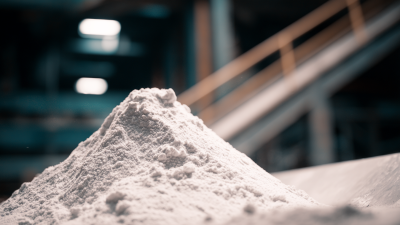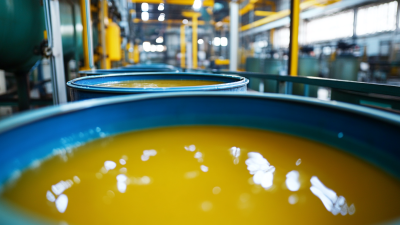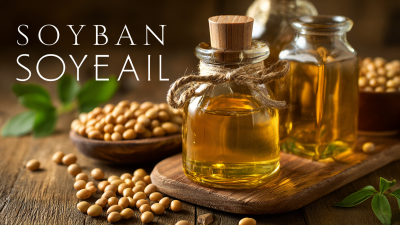
News
Essential Checklist for Sourcing High-Quality Tylosin Phosphate: What You Need to Know
In the agricultural and pharmaceutical industries, Tylosin Phosphate has gained significant attention due to its potent antimicrobial properties and its pivotal role in promoting animal health. According to a recent report by Fortune Business Insights, the global veterinary antimicrobial market, which includes Tylosin Phosphate, is projected to reach USD 5.1 billion by 2026, reflecting a compound annual growth rate (CAGR) of around 6.3%. This rise underscores the increasing demand for effective veterinary solutions, particularly in livestock production. As producers seek to source high-quality Tylosin Phosphate, understanding the essential criteria for selection becomes crucial. This blog will provide a comprehensive checklist that outlines key factors to consider, ensuring that businesses maintain the highest standards in their sourcing processes while addressing both compliance and efficacy in animal health management.

Understanding Tylosin Phosphate: Key Properties and Benefits
 Tylosin phosphate is a macrolide antibiotic commonly used in veterinary medicine, particularly in livestock and poultry to manage infections and promote growth. One of its key properties is its ability to inhibit bacterial protein synthesis, effectively targeting a broad range of Gram-positive bacteria. This makes tylosin a popular choice for treating respiratory and intestinal infections, ensuring the health and productivity of animals, which is essential for the agricultural industry.
Tylosin phosphate is a macrolide antibiotic commonly used in veterinary medicine, particularly in livestock and poultry to manage infections and promote growth. One of its key properties is its ability to inhibit bacterial protein synthesis, effectively targeting a broad range of Gram-positive bacteria. This makes tylosin a popular choice for treating respiratory and intestinal infections, ensuring the health and productivity of animals, which is essential for the agricultural industry.
Beyond its antimicrobial properties, tylosin phosphate offers several benefits that contribute to its widespread use. It is known for its excellent solubility in water, allowing for easy incorporation into feed and drinking water formulations. Moreover, it has been shown to enhance feed efficiency, leading to better weight gain and overall performance in livestock. These characteristics not only help in disease management but also align with the growing demand for sustainable and responsible livestock production practices, as tylosin phosphate minimizes the need for higher antibiotic usage and promotes animal welfare.
Identifying Reliable Suppliers: What to Look for in Your Partner
When sourcing high-quality Tylosin Phosphate, identifying reliable suppliers is crucial for ensuring product integrity and compliance with industry standards. According to a recent report by MarketsandMarkets, the global veterinary antibiotics market, which includes Tylosin Phosphate, is projected to reach $4.3 billion by 2026, showcasing the demand for high-quality inputs in animal healthcare. Therefore, choosing a supplier with a solid reputation and demonstrated expertise in veterinary pharmaceuticals is vital.
One key factor to consider is the supplier's certifications and standards. Suppliers should comply with Good Manufacturing Practices (GMP) and hold relevant certifications such as ISO 9001. These certifications indicate a commitment to quality and regulatory compliance. Furthermore, evaluating the supplier's track record in providing consistent product quality is essential. A study by Grand View Research highlights that 62% of companies prioritize quality assurance when selecting suppliers. By focusing on these factors, you can better assess potential partners and ensure that they not only meet your quality requirements but also align with your long-term operational goals.
Quality Control Standards: Ensuring Purity and Potency of Tylosin Phosphate
When sourcing high-quality Tylosin Phosphate, adhering to stringent quality control standards is paramount. This ensures that the final product is both pure and potent, meeting the demands of modern pharmaceutical applications. A critical method for assessing the purity of Tylosin Phosphate involves the simultaneous determination of its content and potential impurities, similar to what is done with other pharmaceutical compounds. For instance, methodologies like High-Performance Liquid Chromatography (HPLC) have been established to reliably quantify both the active substance and its impurities.
In evaluating Tylosin Phosphate, manufacturers must align their processes with established pharmacopoeia standards, such as those set forth by the European Pharmacopoeia. This framework provides a comprehensive guide for determining acceptable impurity levels, which is vital for ensuring that the drug maintains its efficacy and safety profile. By implementing rigorous quality assurance mechanisms and conducting regular testing, suppliers can ensure that every batch of Tylosin Phosphate upholds the highest standards of quality, ultimately benefiting end-users in various applications.
Quality Control Standards for Tylosin Phosphate
Sustainable Sourcing Practices: Ethical Considerations in Professional Relationships
In the pursuit of high-quality Tylosin Phosphate, sustainable sourcing practices are paramount. Ethical considerations should guide every aspect of supplier relationships, ensuring that sourcing decisions are aligned with environmental and social responsibility. According to a 2022 report by the World Health Organization, the use of antibiotics in agriculture can have detrimental effects on ecosystem health, leading to concerns about antibiotic resistance. As such, sourcing Tylosin Phosphate from suppliers who prioritize sustainable farming practices contributes not only to product quality but also to the overall well-being of the environment.

Engaging in transparent communication with suppliers about their manufacturing processes and ingredient origins is essential. A study by the Global Sustainability Initiative revealed that 70% of consumers are more likely to support brands that are committed to sustainable sourcing. This consumer demand drives companies to adopt ethical sourcing strategies, which can lead to more robust business relationships. By collaborating with suppliers who adhere to , businesses can foster trust and integrity, enhancing their brand reputation while supporting sustainable industry practices.
Cost vs. Quality: Balancing Budget Constraints with Product Excellence
When considering the sourcing of high-quality Tylosin Phosphate, it's essential to strike a balance between cost and quality. As a vital antibiotic used in veterinary medicine, the demand for Tylosin Phosphate is high, leading to various options in the market that differ significantly in both price and quality. Companies often face budget constraints, making it tempting to choose lower-cost alternatives. However, compromising on quality can lead to ineffective results, affecting the health of animals and ultimately impacting the reputation of a business.
To navigate these challenges, it's crucial to conduct thorough research and engage with reputable suppliers who prioritize product excellence. Understanding the manufacturing processes and sourcing raw materials can provide insights into the quality of Tylosin Phosphate being offered. Moreover, investing time in evaluating suppliers through certifications, reviews, and transparency can ensure that you do not sacrifice quality for cost. In the long run, the benefits of high-quality products often outweigh the initial financial savings, leading to better outcomes for both the animals treated and the overall success of the business.
Essential Checklist for Sourcing High-Quality Tylosin Phosphate: Cost vs. Quality
| Aspect | Details | Cost Considerations |
|---|---|---|
| Supplier Reputation | Check industry reviews and certifications. | High-quality suppliers may charge a premium. |
| Purity Levels | Ensure > 90% purity for effectiveness. | Higher purity often means higher costs. |
| Regulatory Compliance | Must comply with local regulations and FDA standards. | Compliance can add to manufacturing costs. |
| Technical Support | Availability of technical assistance for formulation. | More support may increase purchase price. |
| Shipping and Handling | Consider logistics and delivery times. | Faster shipping could raise costs substantially. |
| Sample Testing | Request samples to assess quality before bulk purchase. | Costs for samples may vary widely. |
Related Posts
-

Mastering the Essentials of Best Tylosin Phosphate for Global Procurement Success
-

Exploring Industry Applications of Best Ethyl Acetate and How to Maximize Its Benefits
-

The Ultimate Guide to Sourcing the Best Phytic Acid: Trends, Benefits, and Market Insights for Global Buyers
-

Global Excellence in Liquid Paraffin Manufacturing: China’s Commitment to Quality
-

Unlocking the Health Benefits of Best Soybean Oil: A Global Perspective on Nutritional Value and Quality
-

Revolutionizing Nutrition Trends in 2025 How Best Vitamin C Coated Products Enhance Global Supply Chain Efficiency





